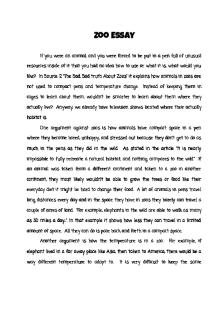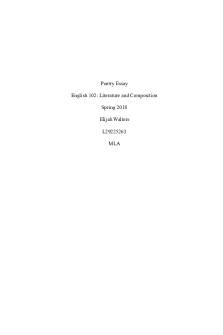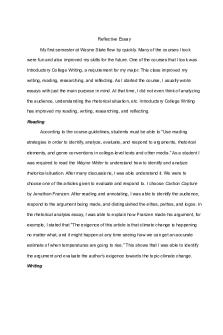Gen Z essay - Grade: B+ PDF

| Title | Gen Z essay - Grade: B+ |
|---|---|
| Author | Luke Staben |
| Course | English Composition |
| Institution | Gonzaga University |
| Pages | 9 |
| File Size | 129.9 KB |
| File Type | |
| Total Downloads | 113 |
| Total Views | 150 |
Summary
ESSAYS...
Description
Staben 1 Feedback request 1. I would like you to look at Thesis/ Introduction of ideas. I felt I made my thesis answerable and was able to answer it in my essay. I broke up the thesis in to two parts. First, I addressed the socially liberal claim and then I focused on the fiscally conservative claim. Do you think I did an adequate job writing my thesis? Also, did I do an adequate job addressing both claims made in my thesis. 2. I would like you to look at my addressing of the so what/who cares questions. I answered these questions after each part of my paper. In this section I referenced back to my evidence for the claims I was making. Do you think I did an adequate job answering these questions and do you think I fit them well into my paper.
Staben 2 Luke Staben Professor Ginger Grey English 101 28 September
How different would life be for someone coming out in the 1970’s than it is today? I know the idea terrifies me when I think about how much more difficult life would be if I had to come out 50 years ago rather than being able to more recently. For many years people of the LGBT community were pushed to the fringes of society. They were bullied, beaten, and forced to “pray the gay away.” Gradually, things began to change. People became more and more accepting, and there is far less hate directed at minorities today than there has been historically. Of course, there are still hateful people in Generation Z, but for the most part, whether it be sexuality, race, or gender Generation Z is exceedingly accepting. This growing openness to those outside of the majority has translated into an increasingly socially liberal mindset among younger citizens. However, they also had to live through a major recession and also tend to have less trust in the political process. That lack of trust causes them to be fiscally conservative. Overall, people who were both born in the USA and Generation Z are more socially liberal but fiscally conservative when it comes to political ideologies. This is because Generation Z is more accepting of others, diverse, less faith in the government, and have seen the damage money mismanagement can cause. Most people in Generation Z, also known as post-millennials, find that politics divide us more than it did ten years ago. It was not even close, with 82% of people surveyed finding that politics divide us more today. Despite this, when it came to social issues, Generation Z was
Staben 3 consistently mostly accepting. 62% identified as socially liberal, nearly 90% supported same-sex marriage, 70% supported the right for a person to choose their gender, and over 80% supported abortion (Staben). These numbers are incredible considering that respondents answered so heavily that politics divided us. It is clear that in general post-millennials tend to be more liberal on LGBT issues and are also more diverse. To start, Generation Z is the most diverse generation in history. As a more diverse generation, this naturally leads to a higher tolerance for other ethnicities. It is more common for them to see someone that does not have the same skin tone as they do which leads to a higher level of awareness that minorities face. Furthermore, the vast majority of Generation Z supports same-sex marriage and are far more liberal when it comes to transgender issues (Laher). Generation Z seems to view others as people equal to them no matter what differing identities they may have. When it comes to people of minorities, whether they are black, gay, or Muslim post-millennials are more tolerant of them. People born in Generation Z are the first generation where nearly half of the people entering the workforce consider themselves non-Caucasian. In addition, they are far more socially aware than those before them. In a survey conducted by Rachel Harris-Russell, “66% of those entering the workforce would take a pay cut to work for a more socially aware company” (Gale 10). Even more important than money is how socially aware a company is. They would instead work with a company that shares their values and belief system than a company where they could earn more money. Their social beliefs are rooted in the diversity of the generation. They are growing up around people who may have a different skin pigmentation than them, but in their eyes this is normal. While their grandparents may have grown up during segregation,
Staben 4 post-millennials have grown up considering people of many races and ethnicities friends, neighbors, and colleagues. Diversity is the most significant factor of why post-millennials are so accepting of others. Heterosexual white males are the most likely group to be intolerant of others; they are more likely to be concerned about protecting their interests than other groups. To state the obvious, if a generation has fewer white males they will be more tolerant. However, the effect diversity has goes far beyond merely diluting the xenophobia of white males. In schools, students’ classmates have the biggest impact on a person’s social development. Therefore, as heterosexual white males congregate with more tolerant people, they will be far more likely to have their social views influenced by them. Those who interact with people of other races become far more aware of racism and also become far more tolerant than other races (Neville 179-190). Put quite simply; the world is changing. This shift in levels of acceptance, whether it be regarding LGBT issues, race, or abortion, show the need for people to be more accepting if they want to be attractive to post-millennials. Politicians have to consider this because they can no longer leave out the majority in their campaigns. Not only will this cause the apparent lack of support from the minority, but it will also cause those in the ethnic majority not to support that candidate. People across all races in Generation Z not only desire social awareness but also expect it. It also matters for job recruiters. A company who is not socially aware will look much less enticing to top candidates from Generation Z. Even if that company could offer a desirable employment package, the candidate would more likely go to a company that shared their values. Despite being socially liberal post-millennials tend to be fiscally conservative. The majority of Generation Z is fiscally conservative. Despite the majority of respondents claiming to be socially liberal about 60% said they were fiscally conservative. On
Staben 5 top of this, 75% felt capitalism was better than socialism, and 70% felt the government should be forced to submit a balanced budget no matter what (Staben). The fiscal conservatism is a result of what Generation Z faced growing up in an economic meltdown. Generation Z is much more concerned with money management. Post-millennials are much more interested in maximizing the value of every dollar and remain especially considered with saving money. They tend to be far more pragmatic than millennials were, a direct result from living in the 2008 recession (Dyer). Generation Z had to see many of their parents get laid off during the recession. This had a significant impact on them and caused them to value financial security much more than prior generation did. They are also much more loyal to their companies once they find the right fit. This loyalty is based off of a sense of security that postmillennials can find with the right company (Gale). This conservative behavior is mostly a result that the government cannot do an adequate job. Conservative spending or fiscal policy and distrust in the government are linked. To be very clear, someone can be liberal and still distrust the government, but it is apparent that the vast majority of the time distrust in the government leads to tax cuts or other conservative budgetary decisions. This lack of trust does not lead directly to social issues rather it tends only to cause people to desire more fiscally conservative measures. They are concerned that the government is not using their money effectively and therefore wasting it. A Democrat, for example, may vote for something more fiscally conservative (Dyck 612-620). It was found 70% of people do not trust the government to do an adequate job (Staben). A University of London professor had similar findings. She found that “only one in 10 of this generation, [Generation Z], say they trust the government to do the right thing” (Hertz). It is clear that this distrust in the government leads to fiscal conservatism.
Staben 6 Fiscal conservatism is something that Democrats hate, and Republicans love. This potential shift in fiscal beliefs concerns everyone from politicians to general citizens. Politicians will be forced to adapt to these post-millennials as more and more reach the voting age and become a significant force in the political landscape. Citizens will need to be aware of the potential of a shifting economic landscape as those in power shift their beliefs to stay in power. This possible shift can affect everyone from veterans to those on welfare. Do you ever wonder how those begging for money on street corners got to that situation? As Generation Z becomes a more substantial and more significant force in politics, the landscape in fiscal policy will shift. These post-millennials could force politicians into more conservative economic beliefs because of their distrust in the government. However, not all hope is lost for liberals. Generation Z is largely progressive leaning when it comes to social issues in comparison to past generations. Generation Z is more diverse, and diversity leads the way to more tolerance. While Generation Z is more fiscally conservative, they are equally socially liberal.
Staben 7 Works Cited Dyck, Joshua J. “Political Distrust and Conservative Voting in Ballot Measure Elections.” Political Research Quarterly, vol. 63, no. 3, 2010, pp. 612–626. JSTOR, JSTOR, www.jstor.org/stable/25747962. Dyer, Sara. "Millennials Vs. Gen Z: Comparing the Youngest Generations.", May 29, 2018, https://www.nolamediagroup.com/millennials-vs-gen-z-comparing-the-youngestgenerations/. Gale, Sarah F. "What HR Leaders Need to Know about Generation Z." Workforce, vol. 97, no. 5, 2018, pp. 10, http://proxy.foley.gonzaga.edu/login? url=http://search.ebscohost.com/login.aspx? direct=true&db=a9h&AN=131416323&site=ehost-live Hertz, Noreena. "Think Millennials have it Tough? for 'Generation K', Life is Even Harsher.", Mar 12, 2016, https://www.theguardian.com/world/2016/mar/19/think-millennials-have-it-toughfor-generation-k-life-is-even-harsher. Loehr, Anne. "Conservative Or Liberal? for Generation Z, It’s Not that Simple.", 20 Oct, 2017, https://www.huffingtonpost.com/entry/conservative-or-liberal-its-not-that-simplewith_us_59ea34f7e4b034105edd4e32. Neville, Helen A., et al. "Changes in White College Students' Color-Blind Racial Ideology Over 4 Years: Do Diversity Experiences make a Difference?" Journal of Counseling Psychology, vol. 61, no. 2, 2014, pp. 179-190, http://proxy.foley.gonzaga.edu/login? url=http://search.ebscohost.com/login.aspx? direct=true&db=a9h&AN=95772308&site=ehost-live, doi:10.1037/a0035168
Staben 8 Staben, Luke., Generational Politics., Various Cities, United States., 23 Sept. 2018, Unpublished Digital Survey.
Staben 9 https://baseline.campuslabs.com/gu/2018engl101staben I surveyed on baseline about people’s political views. I asked questions about both social and fiscal politics. I was able to break up the responses based on the generation that each person was from. I cited my survey multiple times in my essay along with other surveys. This really boosted the statistics I was able to provide in my paper which hopefully allows me to be more convincing to the reader. It also allowed me to explore the trend that distrust in the government leads to fiscal conservatism. This really allowed me to better focus my research. One question that interested me was that 70% of people do not trust the government to do an effective job. Further, the trend I was trying to prove in my paper was also shown. The majority of Generation Z is fiscally conservative but socially liberal....
Similar Free PDFs

Gen Z essay - Grade: B+
- 9 Pages

Gen Z A3A Mktg1420 - Grade: DI
- 26 Pages

Rogerian Essay - Grade: B
- 2 Pages

Zoo Essay - Grade: B+
- 2 Pages

Causation Essay - Grade: B
- 4 Pages

Final Essay - Grade: B+
- 12 Pages

Propaganda Essay - Grade: b
- 4 Pages

Poetry Essay - Grade: B
- 5 Pages

Galileo Essay - Grade: B+
- 6 Pages

Fiction Essay - Grade: B
- 7 Pages

EPQ Essay - Grade: B+
- 10 Pages

Law essay - Grade: B
- 9 Pages

Persuasive Essay - Grade: B
- 3 Pages

Evicted Essay - Grade: B+
- 3 Pages

Charities essay - Grade: B+
- 13 Pages

Reflective Essay - Grade: B
- 4 Pages
Popular Institutions
- Tinajero National High School - Annex
- Politeknik Caltex Riau
- Yokohama City University
- SGT University
- University of Al-Qadisiyah
- Divine Word College of Vigan
- Techniek College Rotterdam
- Universidade de Santiago
- Universiti Teknologi MARA Cawangan Johor Kampus Pasir Gudang
- Poltekkes Kemenkes Yogyakarta
- Baguio City National High School
- Colegio san marcos
- preparatoria uno
- Centro de Bachillerato Tecnológico Industrial y de Servicios No. 107
- Dalian Maritime University
- Quang Trung Secondary School
- Colegio Tecnológico en Informática
- Corporación Regional de Educación Superior
- Grupo CEDVA
- Dar Al Uloom University
- Centro de Estudios Preuniversitarios de la Universidad Nacional de Ingeniería
- 上智大学
- Aakash International School, Nuna Majara
- San Felipe Neri Catholic School
- Kang Chiao International School - New Taipei City
- Misamis Occidental National High School
- Institución Educativa Escuela Normal Juan Ladrilleros
- Kolehiyo ng Pantukan
- Batanes State College
- Instituto Continental
- Sekolah Menengah Kejuruan Kesehatan Kaltara (Tarakan)
- Colegio de La Inmaculada Concepcion - Cebu